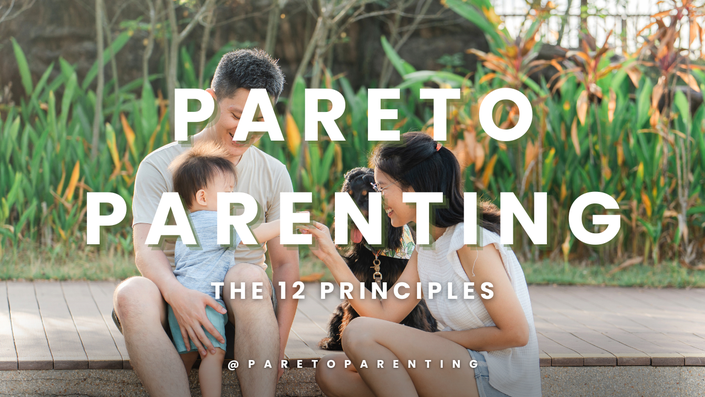
Pareto Parenting's 12 Core Principles
The 12 parenting principles that work because we're all human.
So… who ARE you?
My name is Shona, and I’m a mom to 2 young boys. My husband and I also share our home with a lovely English Cocker Spaniel, Ollie. Both of us work full-time as scientists in healthcare- something I had no idea would become the source of everyday struggle when I first became a mom.

Quitting my job had never been an option. I loved being a scientist and worked hard for years to get here. But really, our idea of living life fully also meant that we had retirement goals and financial plans that needed funding. When I had my first son, it seemed so feasible to leave him with a caretaker while we were away at work. He had grandparents that were available, we had ample childcare options and even had the financial means to hire a live-in helper.
Boy was I wrong. He’d cry when we left him, every.single.day. I shouldn’t have been surprised, I had horrible separation anxiety that lasted way into my teens when I was younger. I’d be physically in office but my mind was never fully present because of the guilt I felt from being away. It didn’t get better when we got his grandparents to care for him. That was probably a worse option with our conflicting views on parenting- I’d be so angry from their overt interference over what my son would eat, how he’d be treated and even when he’d be disciplined. I’d come home after a long day at work to a child who no longer responded to the way I parented, instead defaulting to tantrums, screaming and a refusal to cooperate.
What was it that you wanted?
I just wanted to be a present parent for my children. Arguably, I had part of their morning and the entire evening with them. But mornings were a struggle with separation anxiety and tears while evenings were an uphill battle with my son. He’d struggle adapting to our quiet wind-down routine after spending the whole day watching TV and eating sugary snacks.
It seemed like the problem was our choice of childcare, but deep down, I knew that all my frustration stemmed from the fact that I was not there for my son the way I wished I could. I’d be physically and mentally drained from a day at work and was not stepping up as a parent to feed, bathe and connect with him the way I wanted to.
I started resenting my job for keeping me away from my son. I lost the focus and drive which saw me through my early career. Work became infinitely less rewarding but that did not change any of the circumstances that my home life was in. I started taking on less at work thinking that it’ll leave me with more energy for my son at night. That was the wrong thing to do- I had lost my fire both ways, as a mom and as a colleague.
What changed for you then?
One thing got me through my days in office back then- I loved reading. Specifically, paywalled scientific articles that our workplace had access to, which would otherwise have cost me upwards of $10,000/month in subscription fees. These were scientifically designed, experimentally tested, peer reviewed studies on topics like
- how the human brain developed
- developmental milestones in children
- problem behaviour modification
- non-verbal communication
- confidence building, and
- emotional maturation, mental health and physchological well-being
These were heavy reads, things I could not have understood if not for the 12 years that I’d been training for as a scientist. But they were exciting because they were things that I thought of every day as a parent: What to do about
- our separation anxiety
- his device addiction
- undoing bad habits picked up in my absence
- emotional dysregulation and tantrum behavior
This was when realisation hit.
I’d spend weeks, if not months, hopefully testing “parenting hacks” I’d find from social media. Some of them worked, but most of them actually made things worse. The constant switching between routines confused both me and my son which made us default back to familiar, comfortable (ie. problem) behavior. I had a limit to how much I could learn from my own parenting experience. Getting support by asking for advice from other parents or family members confused me even more with all the differences between generations and personal opinion that they had.
I had one thing nobody else had though- access to carefully designed, cross-tested and scientifically proven studies about things that actually worked. Every day I’d be casually browsing studies conducted by scientists across thousands of participants, over tens of years, verified by indepedendent researchers across the world, amongst children of different ages, cultures and parenting landscapes.
I had to see whether these strategies actually worked for me in real life or not.
What did you do next?
I tried just one thing on my son. I started small at first, with what limited energy I had. We had major mealtime struggles then- refusal to sit in the high chair, tantrum screams over foods he didn’t like, throwing food off the table and a general inability to sit still unless presented with a screen. The solution was very simple and based on a single scientific principle that I’d later go on to realise solved about 80% of my power struggle woes.
It worked. And quickly. It took me one day of deliberating how to do it, but that very day, he was in his chair with no kicking or squirming. Two meals later, screens had vanished from our table. Impulse control took a bit of practice, but within a month, he’d tolerate different foods on his plate with no more food throwing.
I tried the same thing and that worked on his refusal to get into the shower too. It shocked me at how I was still tired after a day at work, but parenting was actually getting easier.
That sounds too good to be true.
These were things that I had control over when he was around me, but he’d default back to the same bad habits in my absence. And it was also the tip of the iceberg. So far, nothing had worked for us when he really blew his top and melted down at morning good-byes.
What’s worse was it created a whole different suite of problems. As I became a more active and present part of his life, we formed a better relationship. A more preferential relationship. I was quickly becoming the only one he’d accept during mealtimes, bathtimes and bedtimes. It made the morning separation anxiety worse and I could never catch a break or hang out with anybody else in the evening.

So what happened next?
It turns out that science had the solutions to these problems as well. I’d just been using the wrong lens while reading. The solutions were staring at me in my face all this time. I thought that my whole suite of problems needed an even larger suite of solutions but the more I read, the more something became more and more apparent:
The same few themes kept repeating themselves.
The same few core principles.
That was a shocking realisation, that the same few core principles could go on to generate a ridiculous variety of outcomes to a whole bunch of different problems.
I could essentially distill out my months of reading into the same core principles that would take me 1 week to understand. That was something that nobody had ever told me before, certainly not when I was getting overwhelmed on social media with the hundreds of trending parenting hacks, styles or ideals.
If I could strip down all that parenting fluff to understand the fundamental core principles behind them, a single week of learning would continue serving me for years as my children grew out of one problem and into the next.
Prove it that it actually works.
A single week of material was light enough to chat about it with my colleagues over lunch and so I did. Most of them were working parents as well, some with children older than mine and some younger. As they started to learn more, we realised that most parenting strategies out there already relied on some of these core principles but were actually being sold to us by “parenting gurus”, “coaches” or “sleep trainers” in courses that could cost upwards of $4997! What was it then- was it the way that they conveyed this material in an easy, readily-digestible way that could be applied immediately?
That brings us back to Pareto Parenting.
That day, Pareto Parenting was born. Pareto Parenting distills out the essence of every single thing I’ve read over the last 3 years into just the 12 fundamental core principles, presented in an easy way for the busy working parent to consume.
These core principles are the key to efficient, effective parenting.
Something we desperately need when we’re always on the lookout for more time to spend with our children and families. Scientists have used public money to study and verify these core principles for years. Somehow this information had always been kept locked locked away in scientific journals, away from parents like us who actually need it the most. Luck led me to stumble upon this realisation, but you don’t need to go through the same journey that I did. That’s what I hope Pareto Parenting will do for you.
Get started now!
Your Instructor

If we haven’t met before - Hi, my name’s Shona 👋
I started experimenting with parenting strategies in 2022, while working full time as a scientist in healthcare. Some of them worked, but most of them actually made things worse. Moving away from online “parenting experts” and back to scientifically tested principles was when I started to see real parenting success.
Pareto Parenting is a compilation of the 12 best parenting principles from science. Combining these principles gets you infinite parenting solutions that actually work.
Frequently Asked Questions
Click here to find out more about Pareto Parenting's Monthly Masterclass!
"This is an excellent course — definitely worth checking out!"
- John Doe, Co-Founder, Impressive Company